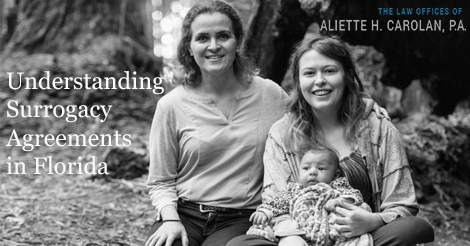From saving lives to creating lives, our society has been known to create miracles. And having the ability to help couples start or grow their families with advanced reproductive technologies is one of them.
 However, with these advancements in reproductive technologies, the state of Florida has had to adjust their laws accordingly in order to protect and address the rights of donors, adoptive parents, biological parents, and even surrogates.
However, with these advancements in reproductive technologies, the state of Florida has had to adjust their laws accordingly in order to protect and address the rights of donors, adoptive parents, biological parents, and even surrogates.
While the area of surrogacy appears to be one that involves more science and medicine than law, a Florida surrogacy attorney is also important to help protect parents’ and surrogates’ rights through the surrogacy process.
Read more here to learn about how a Florida surrogacy attorney can help serve surrogates and parents.
Surrogacy Statistics
Surrogacy has become more and more popular over the years. In fact, according to the Council for Responsible Genetics, it is estimated that approximately 5,000 children were born of surrogacy arrangements between 2004 and 2008.
Furthermore, it is also estimated that approximately 9 children are born of surrogacy arrangements in each state every year.
Determining and Defining a Surrogacy Arrangement
Regardless of whether you are thinking about becoming a surrogate or you are already involved in a surrogate arrangement or you are future parents, expecting your first child, here are some rights you need to know:
=&0=& If you are considering volunteering to be a surrogate for a couple in the state of Florida, the first step is to define the type of surrogacy arrangement, as your rights as a surrogate will vary depending on the type of arrangement.
There are two different surrogacy arrangements:
=&1=&) A genetic arrangement – Fertilization involves your egg and the sperm of one parent or the sperm from a separate donor
=&2=&) A gestational arrangement – The surrogate carries the fertilized embryo of the future parents
=&3=& In a genetic surrogacy arrangement, or also known as “traditional surrogacy”, the surrogate’s biological egg is fertilized. Therefore, the child that she carries is biologically related to the surrogate mother under Florida state law.
Therefore, in order for the commissioning parents to be considered legal guardians of the child, they must proceed with an official adoption process.
=&4=&On the other hand, in a gestational surrogacy arrangement, a fertilized embryo is implanted into the surrogate for her to carry the child to term.
In this situation, the child born is NOT biologically related to the surrogate mother, which means the future parents do not have to go through the legal adoption process. However, an official affirmation of parental rights is still conducted through a Florida surrogacy attorney.
Learn about : What You Need to Know in a Surrogacy Agreement
What if an Egg or Sperm Was Donated?
In-vitro fertilizations involve a donated sperm or egg that is implanted into the surrogate mother. In some cases, a close friend or other loved one is asked to donate his or her sperm or egg in order for a particular couple to have a child with specific genes.
In other cases, however, various parties might have embryos left over, which are donated to couples who desire to have a child or expand their families.
Count on a Florida Surrogacy Attorney for Legal Help
A surrogacy arrangement is an exciting time for new parents, as well as parents who desire to expand their families. However, a surrogacy arrangement can quickly turn upside down if the proper legal formalities and processes aren’t properly in place.
Ensure the legal success and outcome of your surrogacy arrangement by working with a Florida surrogacy attorney.
Visit here to learn about how a Florida surrogacy attorney can guide you through the surrogacy or adoption process.

 Fertility technology has expanded rapidly in recent years, offering innovative ways for same-sex couples and those struggling with infertility to expand their families. If you’re considering this option for your family, explore different types of surrogacy and become familiar with Florida legislation regarding surrogacy.
Fertility technology has expanded rapidly in recent years, offering innovative ways for same-sex couples and those struggling with infertility to expand their families. If you’re considering this option for your family, explore different types of surrogacy and become familiar with Florida legislation regarding surrogacy.




